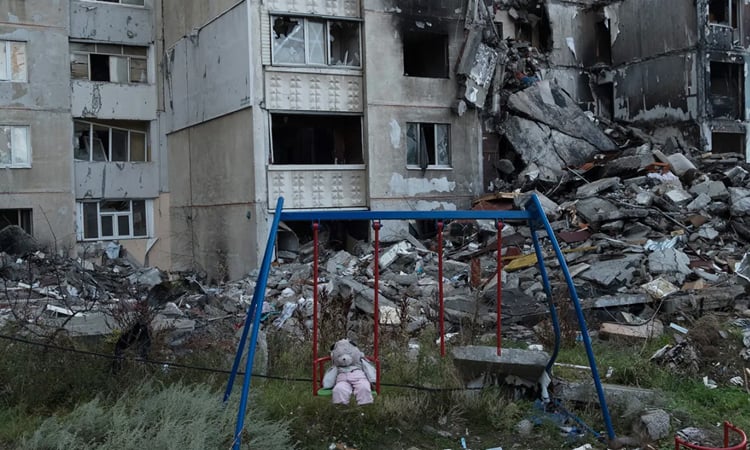News Flash
News Flash

LYMAN, Ukraine, May 22, 2025 (BSS/AFP) - Lidia Isayeva, 86, has been living alone in a cellar to shelter from Russian strikes that have destroyed her apartment and part of her hometown.
Asked if she has any plans to leave Lyman, a town near the front in eastern Ukraine, she is categorical: "Never!"
"I have a paradise here," Isayeva told AFP, in the narrow underground corridor that served as her kitchen, the scent of cooked onions cutting through the musty air.
Her husband is buried in the town and she cannot fathom being apart from him.
"I want to be close to him, and nowhere else."
The answer is the same as on the several previous occasions AFP visited her since last year.
"We're home, we'll die at home," she said.
Despite the risks, some Ukrainians choose to stay on in the ruins, holding on to a lifetime of memories in towns where many have lived forever.
Many are elderly residents who fear they have nowhere else to go or who cannot bear the trauma of leaving.
Wearing a purple jumper and felt slippers, Isayeva said she never thought her "life would be like this".
Sitting in her armchair, she scrupulously crosses off each passing day on a calender.
Millions have fled the fighting in Ukraine's east over the last decade. First when Russian-backed separatists launched an offensive in 2014 and more after Russia's full-scale invasion in 2022.
- Dangerous optimism -
Some have since returned.
Isayeva's neighbour, Valentyna Romenska, said she was evacuated to Kyiv three years ago.
Everything was going well until the 86-year-old pensioner discovered bedbugs in her new home.
She returned to Lyman, just ten kilometres (six miles) from the front, and sees no reason to leave again.
The explosions do not bother her because she is "a bit deaf."
And anyway, a metal screw she uses to tell "fortunes" recently predicted "peace in May".
Two short-term truces declared by Russia have not stopped the fighting -- and often complicated evacuation efforts.
"Several times we came to an address and the person said, 'Why should I evacuate, it seems to be calm'," said Eduard Skoryk from East SOS, which helps people evacuate from the front.
His colleague, 33-year-old Roman Bugayov, said people want everything to work out and are willing to believe "rumours".
"It's an optimism that can lead to death," he warned.
Skoryk said he recently went to a house where he was supposed to evacuate the residents, only to find it reduced to rubble by a strike.
- Leaving is frightening -
Regional authorities regularly call on residents near the front line to flee, and evacuations are mandatory in the most dangerous areas.
The refusal of some residents to leave frustrates those risking their lives to try to save them.
Many of the rescuers themselves had to flee their hometowns and know that leaving is scary.
But Bugayov said he was "indignant" at some who choose to stay.
Sometimes they have to move the same family "two, three, four times" said Pavlo Dyachenko, a police officer from the White Angels unit, which specialises in evacuations.
Sometimes people who are evacuated and then return are killed by a strike.
A minority of the holdouts are quietly waiting for the Russian army to arrive.
Others stay out of fear they cannot afford to live anywhere else.
Internal refugees receive a monthly allowance of around $48 per adult and $72 per child.
Isayeva said she would need "a bag of money" to leave, as her savings would not be enough to get by in areas more expensive than those near the front line.
Dyachenko said that experienced teams understood very quickly whether a person could be persuaded to leave or if it was pointless.
Still, they can be surprised at times.
The police officer recalled a recent example of woman who was refusing point-blank to leave Pokrovsk, a town under constant Russian fire.
As a last resort, the rescue team showed her a video message from her sister, whom she had not seen for ten years.
"I'm waiting for you," the sister said, urging her to evacuate.
Within minutes, the woman had packed her belongings and was on the road with the rescue team.